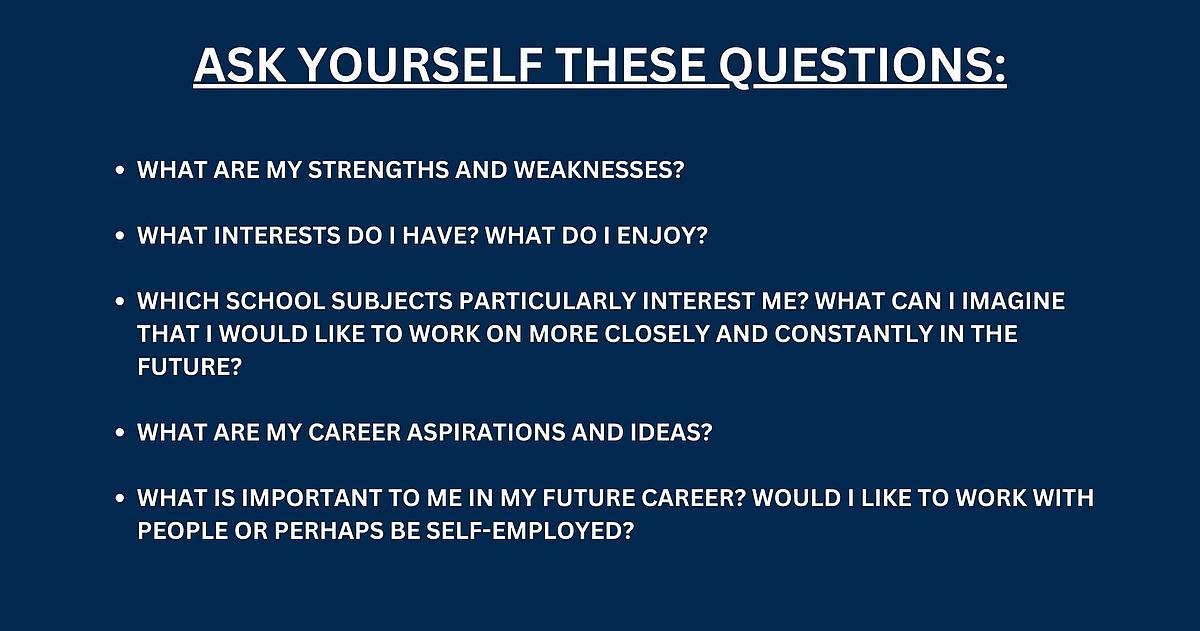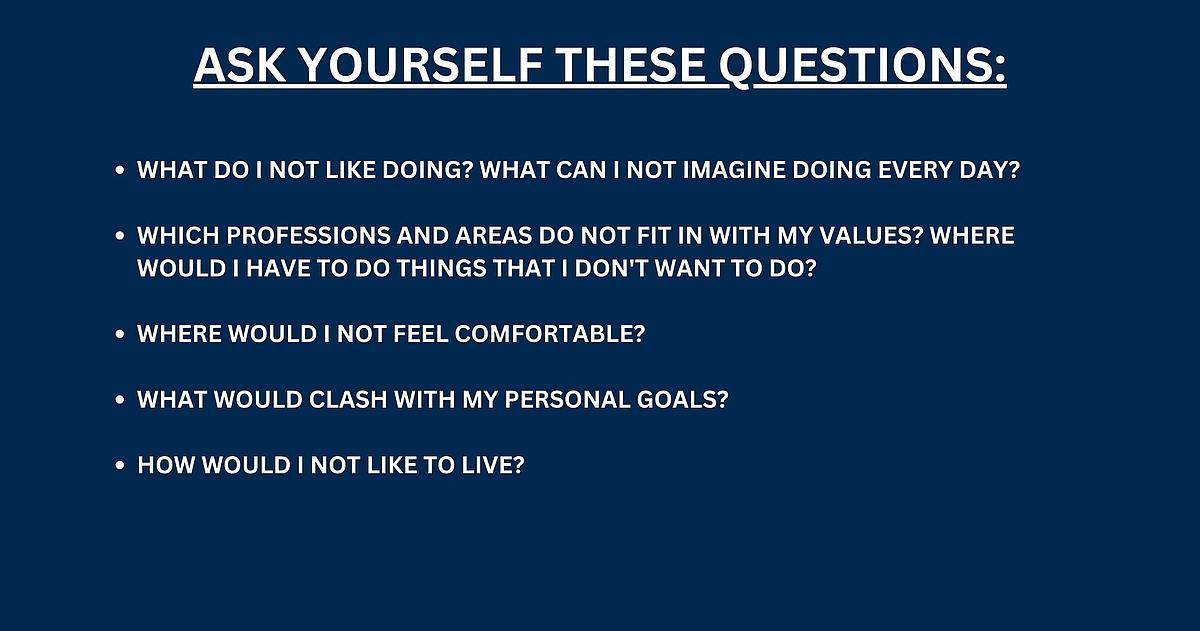This Website uses cookies to improve your visit on our website. More Info
Finding the right study program: What should I study?
The question "What should I study?" represents one of the most fundamental and at the same time most challenging decisions that young people are confronted with. Choosing a field of study is not only a decisive step on the academic and professional path, but also a profound self-reflection on one's own interests, abilities and goals. However, with the right information, an open mind and a strategic approach, the search for the right field of study can become an exciting journey of self-discovery and setting the course for the future.
Do I want to study? Why do I want to study?
Whether you want to study and why depends on your personal, professional and academic goals. Many choose to study to gain specialized knowledge and skills in a particular field, to improve their chances in the job market, or because certain career paths require a university degree. A study program also offers the opportunity to develop critical thinking, research skills and independence.
Other reasons for study may include a desire for personal development, the pursuit of a higher income or the desire to contribute to research and innovation. Some also seek the academic experience to network, gain new perspectives and explore the world.
It is important that you thoroughly reflect on your motivation for studying to ensure it is the right path for you. Think about what your goals are and how studying can help you achieve them. Also consider alternatives to study, such as vocational training or direct entry into the world of work, which may be more suitable depending on your interests and career goals.
Personal Questions:
What are my strengths and interests?
To determine your strengths, what you enjoy and your interests and to answer the question "What should I study?", you can take the following steps:
- Self-reflection: Take time to think about past experiences where you felt particularly engaged, successful or satisfied. Think about which activities or subject areas were involved.
- Get feedback: Ask family, friends and colleagues what they see as your strengths and what activities they notice you thrive at. Outsiders can often recognize skills and interests that you may not be aware of yourself.
- Make lists: Make lists of your hobbies, favorite subjects in school or universities where you would like to study, and the activities that make time fly by. Also include skills for which you are often praised.
- Exploration and experimentation: Engage in new activities to find out what you enjoy and are good at. This can be done through volunteering, online courses, internships, workshops or reading books and articles on various topics.
- Career counseling and career tests: Use professional career counseling services or career tests available online. Such resources can help identify your strengths, interests and suitable career fields.
- Set goals: Think about what your long-term goals are and how your strengths and interests can contribute to achieving them. This can help you get a clearer idea of what you really want.
The combination of these steps can give you a broader view of yourself and help you to make decisions about your future and therefore answer the question "What should I study?". It's important to remember that people evolve; what is a strength or interest today may change over time. Keep an open mind and be willing to evolve with your interests.
Overview of strengths & interests
To answer the question "What should I study?", answer the following questions:

What don't I want to do?
To figure out what you don't want to do in relation to the question "What should I study?", it's helpful to identify areas that make you uncomfortable, don't pique your interests or contradict your values. Here are some considerations that can help you gain clarity:
- Activities that you avoid: Think about tasks or activities that you have consciously avoided because you don't enjoy them or find them particularly challenging, and not in a way that makes you grow, but rather demotivates you.
- Values and principles: Think about what values are particularly important to you and what types of work or what industries might not align with those values. For example, you might value environmental protection and therefore exclude work in certain environmentally harmful industries.
- Work environment and culture: Reflect on the type of work environment that makes you feel uncomfortable. This could be an extremely competitive environment, a place with no teamwork or a job that offers little work-life balance.
- Physical and emotional reactions: Pay attention to your physical and emotional reactions to certain activities. Boredom, stress or dissatisfaction can be indicators that these activities are not for you.
- Long-term goals and ambitions: Compare potential career paths with your long-term goals and life plans. If a particular path takes you away from these goals, it could be a sign that it's not right for you.
- Lifestyle: Consider the lifestyle that certain careers entail and decide if it's a good fit for you. For example, some careers require frequent travel, long hours or physical labor, which is not ideal for everyone.
By actively thinking about these points, you can better understand what you want to avoid in your career and academic path. Knowing what you don't want is just as important as knowing what you do want, as it can make decision-making easier and lead to greater satisfaction when you find the answer to the question "What should I study?".
Overview of wishes & ideas
To answer the question "What should I study?", answer the following questions about your dislikes:


Which professions
do I find exciting?

Steps to finding a career
| Research | Find out about different professions. The internet offers a wealth of resources, including job portals, job descriptions and career blogs that provide insights into the everyday life of different professions. Pay particular attention to careers that relate to your interests and passions. |
|---|---|
| Careers advice | Use the services of careers advisors or careers advice centers. They can help you identify your strengths and interests and show you career opportunities that might suit you. |
| Networking | Talk to people who work in areas that interest you. Informal conversations, informational interviews or shadow programs can give you valuable first-hand insights and help you get a realistic picture of different careers. |
| Take advantage of opportunities | Visit trade fairs or an open day to see first-hand what is possible and what it could look like. |
| Practical experience | Get involved in internships, volunteer work or part-time jobs in areas that interest you. Practical experience is invaluable to find out if a particular career or field is as exciting as you think it is. |
| Online courses and workshops | Use online learning platforms to take courses or workshops in areas that interest you. This can help you develop a deeper understanding of certain subject areas and test your enthusiasm for them. |
| Career tests | There are many online tests that can help you match your interests and aptitudes with potential career fields. Although they are not definitive, they can give you a starting point for further exploration. |
| Stay open to change | Your interests and what you find exciting may change over time. It's important to remain open and adaptable and regularly reflect on whether your career ambitions still suit you. |
To find out which careers you find exciting and answer the question "What should I study?", you can use various strategies to help you better understand your interests and passions and explore how these can be translated into possible career paths. These are some steps you can take to help you answer the question "What should I study?". By taking these steps, you can better understand what motivates and inspires you, find out what careers you find exciting and answer the question "What should I study?".
General Information:
Types of study and study locations
The answer to the question "What should I study?" depends on your personal interests, strengths, career goals and preferred learning style. Below are some considerations and information about the different types of studies and the institutions where they are offered to help you decide. To give you a better overview of the options for your study and to help you answer the question "What should I study?", you will also find lists summarizing the advantages and disadvantages of study types (full-time, dual, part-time) and sponsorships (private, state):
Types of studies
- Bachelor's degree: The first academic degree that lays the foundation in a subject area. Usually takes 3-4 years.
- Master's degree: Builds on the Bachelor's degree and deepens knowledge in a specialized field. Usually takes 1-2 years.
- Dual study program: Combines an academic apprenticeship with practical experience in a company. Ideal if you want to learn practically right from the start and gain work experience at the same time.
- Distance learning/online study: Offers flexibility in terms of time and place of study. Suitable if you want to study part-time or need flexibility in terms of location.
Full-time, dual or part-time?
- Full-time study
- Advantages: Immersive learning experience, faster graduation, more time for student life and networking.
- Disadvantages: Less flexibility, limited work opportunities while studying, can be financially challenging.
- Dual study program
- Advantages: Combination of practical experience and theoretical knowledge, often financially supported by companies, easier to start a career.
- Disadvantages: Higher workload, less flexibility in scheduling, choice of courses and companies can be limited.
- Part-time study
- Advantages: Greater flexibility, opportunity to continue working alongside studies, better balance between studies, career and private life.
- Disadvantages: Longer duration of study, possibly fewer offers and support from the university, can make social integration into student life more difficult.
Where to study?
- Universities: Offer a wide range of academic degree programs with a strong focus on theoretical knowledge and research. Ideal if you want to pursue an academic or research-oriented career.
- Universities of Applied Sciences (Fachhochschulen): Focus more on practice-oriented apprenticeships and applied research. Suitable if you are looking for a more application-oriented apprenticeship that prepares you directly for a career entry.
- Universities of cooperative education/Dual universities: Offer dual degree programs that combine study and work in a company. Ideal for practice-oriented learning with a direct link to the job market.
- Art and music colleges: Specialize in creative degree courses and often offer intensive practical apprenticeships in the arts or music.
Private or state?
- State Universities
- Advantages: Generally lower tuition fees, wide range of degree programs, diverse research resources and opportunities.
- Disadvantages: Higher numbers of applicants and therefore potentially higher admission hurdles, larger courses and less personal support in some subjects.
- Private Universities
- Advantages: Often smaller classes and more intensive supervision, close cooperation with companies, specialized courses.
- Disadvantages: Higher tuition fees, range of courses may be more limited, accreditation and reputation vary depending on the institution.
When choosing between these options, you should consider your personal circumstances, career goals and financial means. It's also important to research specific programs and universities to see which ones best fit your needs and goals and answer the question "What should I study?".
Fields of study
The range of study options is extensive and covers numerous subject areas and fields of study. The following list is not exhaustive, as there are many interdisciplinary and specialized degree programs that transcend traditional subject boundaries. Universities are constantly developing new programs to respond to the changing needs of society and the job market and to add more options to the question "What should I study?" for future students.
Overview of the possible fields of study
To answer the question "What should I study?", find out about the possible options here:

The fields of study explained in more detail
Here is a more detailed overview of some of the main categories with brief explanations to give you an idea of the variety of study options and to help you answer the question "What should I study?":
- Humanities and social sciences: These include subjects such as history, philosophy, sociology, psychology, education, political science, anthropology and linguistics. These subjects focus on understanding human cultures, societies and behaviors.
- Economics: This area includes Business Studies (Business Studies), Economics, Finance, Marketing, Accounting and Management. Students learn the basics of economic theories and practices here (e.g. at MBS).
- Natural sciences: Natural sciences include physics, chemistry, biology, geology and astronomy. These subjects deal with the laws of nature and the understanding of the universe.
- Engineering: There are many specializations in this field, including mechanical engineering, electrical engineering, civil engineering, aerospace engineering and environmental engineering. Engineering combines mathematical and scientific principles to develop technical solutions.
- Computer Science and Information Technology (IT): This field includes fields of study such as computer science, software development, artificial intelligence, data science and network engineering. It focuses on the development and application of computer technologies.
- Medicine and Health Sciences: This includes courses such as human medicine, dentistry, veterinary medicine, pharmacy, nursing science and public health. These subjects prepare students for careers in the healthcare sector.
- Art and design: This area includes fields of study such as fine arts, graphic design, fashion, interior design, photography and film. The focus here is on creative and practical skills.
- Teacher training: Degree courses for future teachers that prepare them for teaching in various school subjects and educational levels.
- Law: The study of law or jurisprudence prepares students for careers in various areas of law, including civil law, criminal law and public law.
- Agricultural, forestry and food sciences: These subjects deal with food production and sustainability, land and forest management and aspects of animal husbandry.
- Music and performing arts: Courses in this area focus on music, theater, dance and performance. They combine theoretical studies with practical apprenticeships.
Conditions
When you consider conditions such as the Numerus Clausus (NC) and any entrance or aptitude tests when asking "What should I study?", there are some important aspects to consider:

Numerus Clausus (NC)
- What it means: The NC is an admission restriction that indicates the minimum high school diploma grades (or comparable qualification) you need to be admitted to a university. The NC varies from semester to semester and from university to university, depending on the number of applications and available places.
- Preparation: Find out early on about the NC values from previous semesters for the degree programs you are interested in. This will give you an indication of your chances of admission.
- Alternatives: If your grade point average is not sufficient for the desired degree course, you could look for similar courses with a lower NC, accept a waiting period or enrol in preparatory courses to improve your qualifications.
Admission and aptitude tests
- What they are: In addition to the NC, many universities and universities of applied sciences also rely on special entrance or aptitude tests to assess applicants' abilities and suitability for certain courses. These may include tests that assess logical thinking, language skills, specific subject knowledge or creative abilities.
- Preparation: Prepare thoroughly for these tests by reviewing practice materials and familiarizing yourself with the format and requirements of the test. Many universities offer sample exams or preparation courses.
- Strategy: Find out about the selection process for your chosen degree program. Some universities give more weight to entrance or aptitude tests than grade point average. In such cases, a strong performance in the test can significantly improve your chances, even if your grade point average is not top.
Additional considerations
- Application deadlines: Make sure you adhere to the application deadlines for the degree programs you are interested in. Late applications are generally not considered.
- Multiple applications: If possible, apply to several universities or for several degree programs to increase your chances of getting a place.
- Use counseling: Don't hesitate to contact the student advice centers at the universities. They can provide you with valuable information on admission criteria, the application process and preparation options.
Tip: Don't worry too much
When deciding to study, the pressure to make the perfect choice right away can be overwhelming. However, it's important to realize that the educational path is not a rigid path, but a journey with many opportunities to adapt and change.
Don't worry too much about your choice of study being perfect from the start. Deciding on a major is a significant step, but it's perfectly normal and okay if you realize over the course of your studies that a different major is a better fit for your interests or career goals. It happens to many people. The experiences you gain at the beginning of your studies can give you valuable insights into your true passions and strengths and are therefore an important part of your learning process.
Changing degree programs is not only perfectly fine, but also common. Many students change degree programs at least once during their studies after they have developed a clearer idea of their interests and career goals. Universities are prepared for such changes and offer advice and support to make the transition as smooth as possible. A change can ultimately lead to a more fulfilling study experience and greater career success.
Additionally, professional life today is characterized by many twists and turns, and it is rare for someone's career path to have a 100 percent overlap with their field of study. The world of work is constantly evolving, and the ability to adapt and learn new skills is more valuable than a specialized degree. Many employers are looking for well-rounded employees with a broad skill set, including critical thinking, problem-solving skills and adaptability. A degree provides a solid foundation, but the career you build will depend on a variety of factors, including personal interests, assertiveness, continuing education and work experience.
In short, it's okay if the path isn't clear from the start. A willingness to explore, learn and adapt will help you succeed in both your studies and your professional life.
Further helpful Study Guide pages:
Business studies with vocational diploma
Working alongside your Studies
Back to the GuideFrequently asked questions about the question: What should I study?
If you don't know what to study, it's important that you take time to explore your interests, skills and goals. Think about what subjects or activities you are passionate about and what careers or industries appeal to you. Use resources such as career counseling, online personality tests and university information sessions to learn more about different majors and career paths. Internships or volunteering can give you practical insights into potential career fields. Also talk to students, alumni and professionals to gain first-hand experience and advice. It is also helpful to remember that many people choose a career path that is not directly related to their field of study, and that flexibility and lifelong learning are valuable in today's working world.
If your goal is to earn a lot of money, you should consider choosing degree programs that are traditionally associated with high salaries. These include subjects such as medicine, dentistry, pharmacy, engineering, computer science, economics (e.g. at MBS), and law. These fields are often in demand and offer alumni access to careers with above-average salaries. However, it is important to also consider your interests and passions, as career satisfaction is not determined by salary alone. Furthermore, economic conditions and therefore salary prospects can change over time, so it is advisable to also encourage your own adaptability and willingness to engage in lifelong learning.
If you want to study in Munich and have an interest in business, Munich Business School (MBS) could be an excellent choice for you. MBS offers various degree programs in the field of business administration, including Bachelor's, Master's- and MBA programs. These programs are designed to provide students with comprehensive knowledge in topics such as management, marketing, finance and entrepreneurship. Studying at Munich Business School can help you start or advance a career in the global business world, as the school places great emphasis on international perspectives and practical experience. It is also a great way to network with professionals and like-minded people. Consider your interests and career goals to find the right program for you.
If you want to study part-time, it's important to choose a subject that not only suits your career goals and interests, but is also flexible enough to fit in with your working life. Programs in business administration, management, business informatics, health management or distance learning programs in engineering are popular options as they are often designed specifically for working professionals and offer online or evening and weekend courses. Such courses can help you expand your qualifications and skills, improve your career opportunities and potentially move on to higher positions or more lucrative industries. Choose something that complements your current work experience or allows you to move into a field that interests you more or offers better earning potential.
If you are interested in studying business, Munich Business School (MBS) offers high-quality programs designed to meet the needs of future leaders in the global economy. MBS offers a variety of degree programs, including Bachelor-, Master- and MBA programs in Business Administration with specializations in areas such as International Business, Marketing, Finance and Entrepreneurship. Studying at MBS can provide you with in-depth business knowledge, practical experience through projects with real companies and international perspectives through a global partner university network. This combination prepares you to work successfully in various business sectors and can significantly improve your career opportunities.
Degree courses that focus on future-oriented areas offer good career opportunities and are in particularly high demand in view of technological progress and social change. Fields of study such as computer science, artificial intelligence, sustainability sciences, renewable energies, biotechnology, health sciences and data analysis are considered to be particularly future-oriented. These fields play a key role in the development of new technologies, tackling climate change, improving healthcare and the use of big data in various industries. A study in one of these fields can not only provide you with up-to-date and relevant knowledge, but also prepare you for a career helping to solve some of the world's most pressing problems.
Interested in a study program? Request our information material now!
More exciting degree programs in Munich













